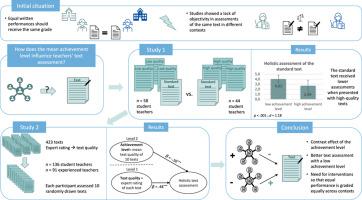情境很重要:揭示成绩水平对教师文本评价的影响
IF 4.7
1区 教育学
Q1 EDUCATION & EDUCATIONAL RESEARCH
引用次数: 0
摘要
背景教师对学生写作水平的评估对于调整教学和提供反馈至关重要。我们的两项研究--一项是实验研究,一项是生态验证研究--探讨了即使在使用相关明确标准的情况下,成绩水平是否会影响教师对个别文本的评估。方法在研究 1 中,参与者被随机分配到两组。高成就水平组的学生教师评估三篇高质量课文和一篇质量一般的标准课文。成绩较差组的学生教师则评阅三篇质量较差的课文和一篇质量一般的标准课文。结果研究 1 中对标准文本的比较显示,与低成就水平组相比,高成就水平组的学生教师在一个整体量表和三个分析量表上对标准文本的评价更负面。研究 2 中的多层次数据分析显示,对于有经验的教师和学生教师而言,成绩水平的高低对文本评价有负面影响。本文章由计算机程序翻译,如有差异,请以英文原文为准。

Context counts: Unveiling the impact of achievement level on teachers’ text assessment
Background
Teachers' assessments of student writing proficiency are essential for adaptive instruction and providing feedback. However, studies have revealed a lack of objectivity in text quality ratings of the same text in different contexts, although texts of identical quality should receive identical teacher judgments.
Aims
Our two studies – one experimental and one more ecologically valid – address whether the achievement level impacts teachers’ individual text assessments even when relevant explicit criteria are used.
Samples
In Study 1, participants were 102 student teachers from a university in Germany. In Study 2, participants were 136 student teachers and 91 experienced teachers from Germany.
Methods
In Study 1, participants were randomly assigned to two groups. Student teachers in the high-achievement level group assessed three high-quality texts and one standard text with average quality. Student teachers in the low-achievement level group assessed three low-quality texts and the same standard text with average quality. Participants in Study 2 assessed ten texts randomly drawn from a large corpus.
Results
The comparison of the standard text in Study 1 showed that student teachers in the high-level achievement group assessed it more negatively on a holistic scale and three analytic scales compared to the low-level achievement group. Multi-level data analysis in Study 2 revealed a negative influence of the quality of the achievement level on the text assessment for experienced and for student teachers.
Conclusions
We discuss how the achievement level can bias teachers’ judgments of specific student performances when concrete assessment criteria should be used.
求助全文
通过发布文献求助,成功后即可免费获取论文全文。
去求助
来源期刊

Learning and Instruction
Multiple-
CiteScore
11.30
自引率
4.80%
发文量
109
期刊介绍:
As an international, multi-disciplinary, peer-refereed journal, Learning and Instruction provides a platform for the publication of the most advanced scientific research in the areas of learning, development, instruction and teaching. The journal welcomes original empirical investigations. The papers may represent a variety of theoretical perspectives and different methodological approaches. They may refer to any age level, from infants to adults and to a diversity of learning and instructional settings, from laboratory experiments to field studies. The major criteria in the review and the selection process concern the significance of the contribution to the area of learning and instruction, and the rigor of the study.
 求助内容:
求助内容: 应助结果提醒方式:
应助结果提醒方式:


